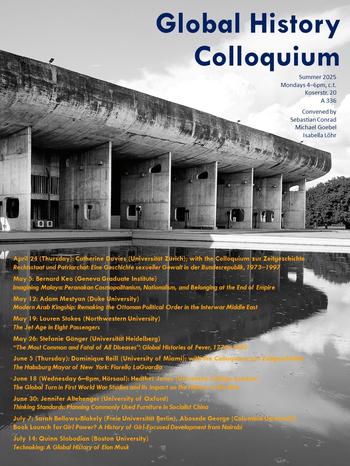Global History Colloquium: Stefanie Gänger (Universität Heidelberg) on “'The Most Common and Fatal of All Diseases': Global Histories of Fever, 1770–1830"
Join us for an engaging colloquium on Monday, May 26, from 16:15 to 17:45 (in person) at Freie Universität Berlin, FMI, Room A336 (Koserstr. 20, 14195 Berlin).
Convened by Sebastian Conrad, Michael Goebel, and Isabella Löhr, the session promises stimulating discussions in an academic setting.
We look forward to seeing you there!
About the Lecture:
The talk is concerned with the history of fever(s) in French, Iberian, and British empires, from the 1770s to the 1820s, a time in which ‘fevers’ were widely considered the most common and fatal ailments afflicting mankind. Emphasizing the historicity and cultural contingency of ‘fever’ and the febrile experience, the presentation explores the period’s disease concept, that ailment’s supposed unusual prevalence during those decades, the contingency of the sufferers’ sensory experience of it and the commonness of protracted recoveries, or sequelae that persons of the period attributed to fevers.
About the Speaker:
Stefanie Gänger is a Professor of Modern History at the University of Heidelberg. Stefanie’s work considers the histories of science, collecting and medicine. In 2023, she was awarded an ERC Consolidator Grant to research the history of fever (FEVER–Global Histories of (a) Disease, 1750–1840).
Please see our Code of Conduct that applies to all Global History Events:






